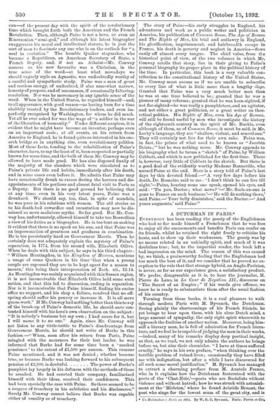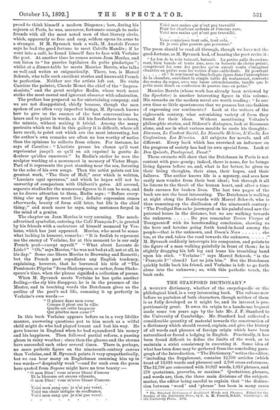A DUTCHMAN IN PARIS.*
EVERYBODY has been reading the gossip of the Englishman who had so far made himself a Frenchman that he was free to enjoy all the amusements and benefits Paris can confer on its friends, whilst he retained the right freely to criticise his hosts, and to show up their weaknesses. The gossip was by no means related in an unkindly spirit, and much of it was doubtless true ; but, to the impartial reader, the book left a bad impression on the mind. The reason of this was caused by, we think, a praiseworthy feeling that the Englishman had too much the best of it, and we consider that he proved no ex- ception to the rule that that strange hybrid, an Anglo-Parisian, is never, so far as our experience goes, a satisfactory product. We prefer, disagreeable as it is, to hear the journalist, M. Pierre de Lano, in La Cour de Napoleon. III., discourse on " The Secret of an Empire ; " if his words give offence, we know he is ready to substantiate them after the usual fashion of his country.
Turning from these books, it is a real pleasure to walk through modern Paris with M. Byvanck, the Dutchman. Seeing plainly the shortcomings of his French friends, he yet brings to bear upon them, with his clear Dutch mind, a large amount of sympathy, the only right spirit wherewith to approach the frailties of another nation. Moreover, being him- self a literary man, he is full of admiration for French litera- ture, and we feel he is capable of judging the men in their works, —indeed, many of his remarks display deep poetical insight, so that, as we read, we not only admire the authors he brings before us, but also their chronicler. "I have at times suffered cruelly," he says in his own preface, "when thinking over the terrible problem of ruined lives ; occasionally they have filled me with indignation, but after a while I have discovered for all such some moral justification." M. Byvanck has managed to extract a charming preface from M. Anatole France, who in it explains how the Dutchman fraternised with the poets of the Chat-Noir,'—poets who are Socialists without violence and without hatred; how he was struck with astonish. ment at the Mirleton,' where he found Aristide Bruant, the poet who sings for the lowest scum of the great city, and is • [In Hollandais a Paris en 1891. By W. G. O. Byvanck. Parisi Perrin et Oie• proud to think himself a modern Diogenes ; how, during his sojourn at Paris, he was, moreover, fortunate enough to make friends with all the most noted men of that literary circle, which, apparently so free and easy, seldom opens its arms to a stranger. If M. Byvanck took a walk, M. Anatole France
says he had the good fortune to meet Catulle Mandes ; if he went into a cafe, he found himself face to face with Verlaine the poet. At another time he comes across Jean Moreas, and can listen to " les paroles lapidaires du poste pindarique "; whilst at a dinner-table he meets Maurice Barres, who talks so well and writes so enigmatically. There, too, is Marcel Schwob, who tells such excellent stories and knows old French to perfection. Neither are the artists left out. He visits Carriere the painter, Claude Monet the chief of the " Impres- sionists," and the great sculptor Rodin, whose work must strike the most casual and ignorant observer with admiration. The preface has prepared us for entertaining company, and we are not disappointed, chiefly because, though the men spoken of are often very imperfect beings, M. Byvanck knows how to give us the essence of the best conversations he hears and to paint in words, as did his forefathers in colours, the minute, withoat making it trivial. Among the many portraits which we find in this gallery it is difficult, where all have merit, to point out which are the most interesting, but the author's own remarks are often no less worthy of notice than the opinions he collects from others. For instance, he says of Carriere : " L'artiste presse les choses qu'il vent representer jusqu'l ce qu'il en ait exprime la goutte de douleur qu'elles enserrent." In Rodin's atelier he sees the sculptor working at a monument in memory of Victor Hugo. Part of it represents the poet standing near the sea, listening to the echo of his own songs. Then the artist points oat his greatest work, " The Gate of Hell," over which is written, " Lasciate ogni speranza," and which he hopes will not be unworthy of comparison with G-hiberti's gates. All around, separate studies for the numerous figures in it can be seen, and as he draws attention to them, Rodin says : " Before every- thing else my figures must live ; definite expression comes afterwards, beauty of form still later, but life is the chief thing;" and much more he says, using sentences forged in the mind of a genius.
The chapter on Jean Moreas is very amusing. The much-
advertised symbolist, entering the Cafe Francois Ier, is greeted by his friends with a caricature of himself menaced by Ver-
laine, which has just appeared. Moreas, who must be some- what lacking in humour, remarks : "It is foolish to represent me the enemy of Verlaine, for at this moment he is our only French poet—except myself." " What about Leconte de Lisle ?" "Oh," says Moreas, " he was not bad at all, not at all, in his day." Some one likens Moreas to Browning and Rossetti ; but the French poet repudiates any English tendency, explaining, however, that he borrowed his title of " The Passionate Pilgrim " from Shakespeare, or rather, from Shake- speare's time, when the phrase signified a collection of poems.
When M. Byvanck meets Verlaine he has quite another feeling,—the sly hits disappear, he is in the presence of the Master, and in touching words the Dutchman gives us the outline of the poet's sad life, summing it up perfectly in Verlaine's own words :- " 11 pleura dans mon cceur Comore it pleut sur la ville.
Quelle est cette langueur Qui penetre mon cceur ?"
In this book Verlaine appears before us in a very lifelike manner, answering questions put to him much as a wilful child might do who had played truant and lost his way. He gave lessons in England when he had squandered his money and his happiness. Then followed partial reform, a passing gleam in rainy weather; since then the gleams and the storms have succeeded each other several times. There is, perhaps, no more pathetic figure on the nineteenth-century canvas than Verlaine, and M. Byvanck paints it very sympathetically, but we can hear many an Englishman summing him up in two words—" despicably weak "—and for such even the poem here quoted from Sagesse might have no true beauty :- " 0 mon Dien vous m'avez blesse d'amour Et la blessure est encore vibrants, 0 mon Dieu! vous m'avez bless° d'amour.
Void mon sang que je n'ai pas verse, Voici ma chair indigne de souffrance, Voici mon sang que je n'ai pas verse.
Voici mes mains qui n'ont pas travaille Pour les charbons ardente et l'encens rare, Voici mes mains qui n'ont pas travaille.
Vous connaissez tout cola, tout cela, Et je suis plus pauvre que personne."
The poem should be read all through, though we have not the good-fortune, as M. Byvanck had, of hearing the poet recite it : " Le ton de in voix baissait, baissait. La petite salle du restau- rant, bien banale et touts nue, avec sa boiserie de chene peinte, comprimait lea sons des paroles qu'on aurait voulu s'imaginer chantees en priers sous les vofites d'une cathedral°. Et pourtant oh ! le sentiment melancholique spars dans Patmosphere de la chambre, aureolant la simple table du restaurant, couverte des restes du repas, avec une lueur attendrissante, tandis que le poet° assis disait sa confession de pauvre Ame en peine."
Maurice Barres (whose work has already been reviewed by the Spectator) is another interesting figure in this volume. His remarks on the modern novel are worth reading : " Is our own time so little spontaneous that we possess but one fashion of expressing our sentiments ? Look at the writers of the eighteenth century, what astonishing variety of form they found for their ideas. Without mentioning Voltaire's philosophic stories, and Diderot's dialogues, look at Rousseau alone, and see in what various moulds be casts his thoughts Discours, Le Contrat Social, La Nouvelle Heloise, L'Emile, Les Confessions, Lea Reveries. All subjects for novels, and all different. Every book which has exercised an influence on the progress of society has had its own special form. Look at Don Quixote, Pantagruel, Faust."
These extracts will show that the Dutchman in Paris is not content with pure gossip ; indeed, there is none, for he brings living figures before us, and, what is far better, he gives us their living thoughts, their aims, their hopes, and their failures. The author knows life is a mystery, and sees how easily men wander from their best ideal ; but through it all he listens to the throb of the human heart, and after a time finds excuses for broken lives. The last two pages of the book are not the least interesting. The Dutchman is walking at night along the Boulevards with Marcel Schwob, who is thus summing-up the disillusion of the nineteenth century " The Prodigal Son as he journeyed on his painful road saw the paternal house in the distance, but we are walking towards the unknown Do you remember Terres Vierges of Tourguenieff with its heartrending conclusion, showing us the hero and heroine going forth hand-in-hand among the people—that is the unknown, and Ibsen's Nora she
too, at the end, takes the road towards the unknown If
M. Byvanck suddenly interrupts his companion, and points to the figure of a man walking painfully in front of them ; he is slightly dragging his left leg and leans his trembling hand,
upon his stick. " Verlaine !" says Marcel Schwob, " is the Francois Ia" closed ? Let us join him." But the Dutchman
quickly holds back his friend, and Verlaine is left to go forth alone into the unknown ; so, with this pathetic touch, the book ends.



































 Previous page
Previous page